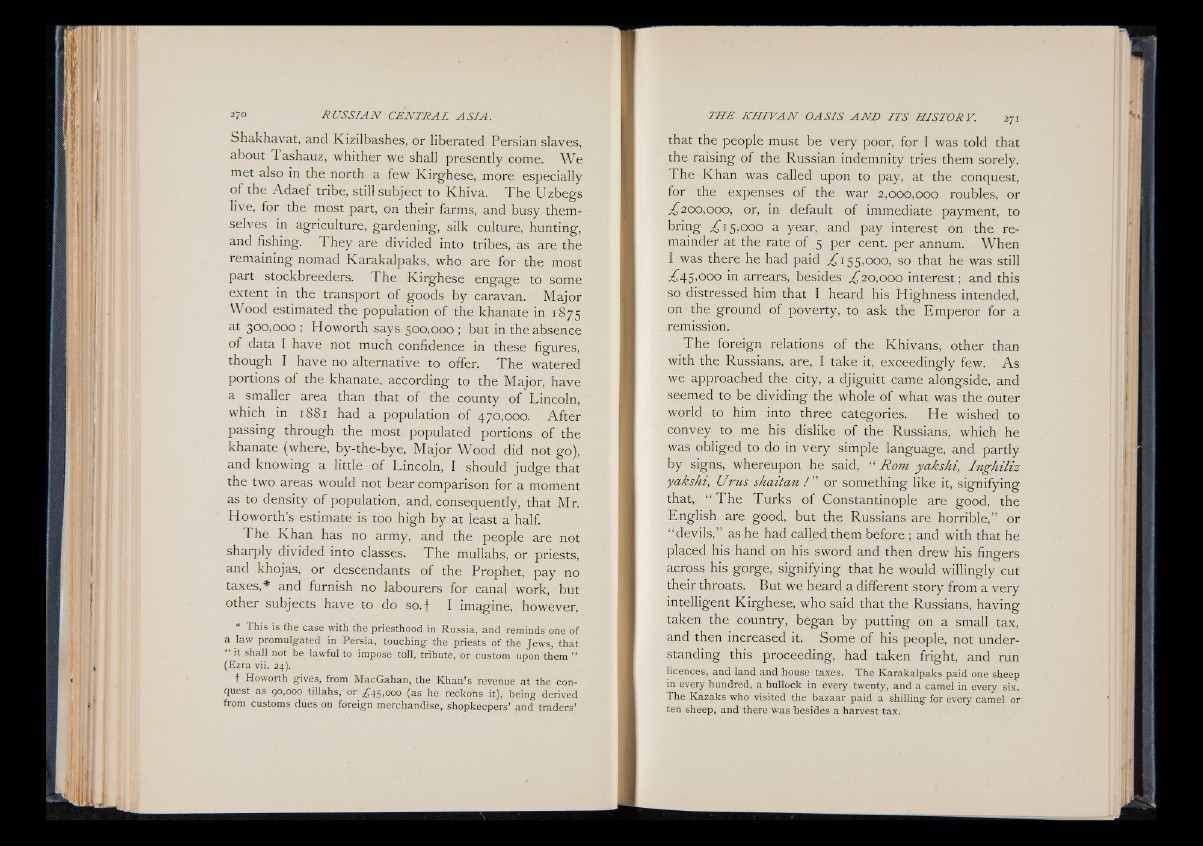
Shakhavat, and Kizilbashes, or liberated Persian slaves,
about Tashauz, whither we shall presently come. We
met also in the north a few Kirghese, more especially
of the Adaef tribe, still subject to Khiva. The Uzbegs
live, for the most part, on their farms, and busy themselves
in agriculture, gardening, silk culture, hunting,
and fishing. They are divided into tribes, as are the
remaining nomad Karakalpaks, who are for the most
part stockbreeders. The Kirghese engage to some
extent in the transport of goods by caravan. Major
Wood estimated the population of the khanate in 1875
at 300,000 ; Howorth says 500,000 ; but in the absence
of data I have not much confidence in these figures,
though I have no alternative to offer. The watered
portions of the khanate, according to the Major, have
a smaller area than that of the county of Lincoln,
which in 1881 had a population of 470,000. After
passing through the most populated portions of the
khanate (where, by-the-bye, Major Wood did not go),'
and knowing a little of Lincoln, I should judge that
the two areas would not bear comparison for a moment
as to density of population, and, consequently, that Mr.
Howorth’s estimate is too high by at least a half.
The . Khan has no army, and the people are not
sharply divided into classes. The mullahs, or priests,
and khojas, or descendants of the Prophet, pay no
taxes,* and furnish no labourers for canal work, but
other subjects have to do so. f I imagine, however,
* This is the case with the priesthood in Russia, and reminds one of
a law promulgated in Persia, touching the priests of the Jews, that
“ it shall not be lawful to impose toll, tribute, or custom upon them ”
(Ezra vii. 24).
t Howorth gives, from MacGahan, the Khan’ s revenue at the conquest
as 90,000 tillahs, or ,£45,000 (as he reckons it), being derived
from customs dues on foreign merchandise, shopkeepers’ and traders’
that the people must be very poor, for I was told that
the raising of the Russian indemnity tries them sorely.
The Khan was called upon to pay, at the conquest,
for the expenses o f the war 2,000,000 roubles, or
,£200,000, or, in default of immediate payment, to
bring ,£15,000 a year, and pay interest on the remainder
at the rate of 5 per cent, per annum. When
I was there he had paid £155,000, so that he was still
£45,000 in arrears, besides £20,000 interest; and this
so distressed him that I heard his Highness intended,
on the ground of poverty, to ask the Emperor for a
remission.
The foreign relations of the Khivans, other than
with the Russians, are, I take it, exceedingly few. As
we approached the city, a djiguitt came alongside, and
seemed to be dividing the whole of what was the outer
world to him into three categories, He wished to
convey to me his dislike of the Russians, which he
was obliged to do in very simple language, and partly
by signs, whereupon he said, “ Rom yakshi, Inghiliz
yakshi, Urus shaitan / ” or something like it, signifying
that, “ The Turks o f Constantinople are good, the
English are good, but the Russians are horrible,” or
“ devils,” as he had called! them before ; and with that he
placed his hand on his sword and then drew his fingers
across his gorge, signifying that he would willingly cut
their throats. But we heard a different story from a very
intelligent Kirghese, who said that the Russians, having
taken the country, began by putting on a small tax,
and then increased it. Some of his people, not understanding
this proceeding, had taken fright, and run
licences, and land and house taxes. The Karakalpaks paid one sheep
in every hundred, a bullock in every twenty, and a camel in every six.
The Kazaks who visited the bazaar paid a shilling for every camel or
ten sheep, and there was besides a harvest tax.